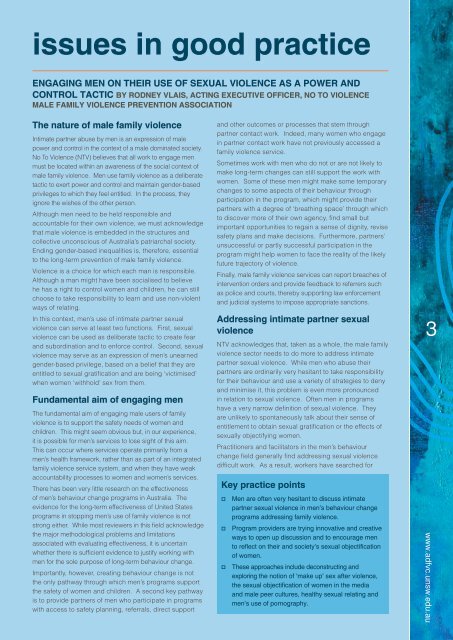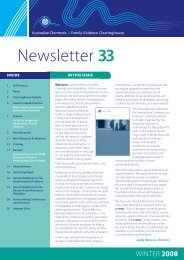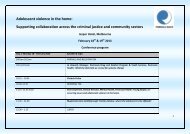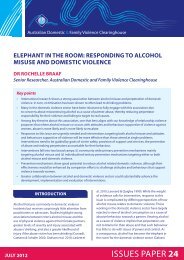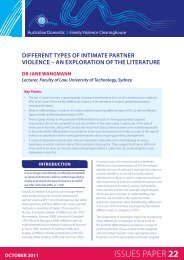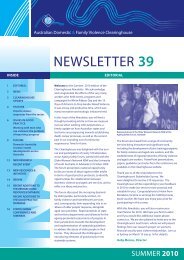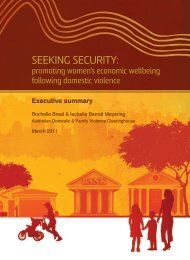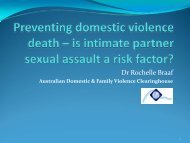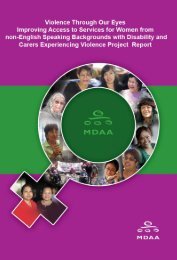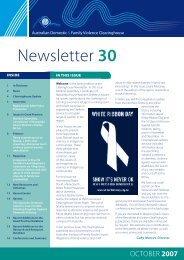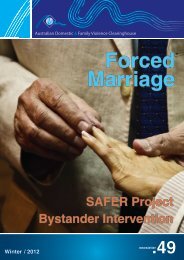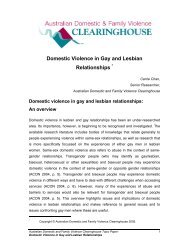Engaging men on their use of sexual violence as a power and ...
Engaging men on their use of sexual violence as a power and ...
Engaging men on their use of sexual violence as a power and ...
Create successful ePaper yourself
Turn your PDF publications into a flip-book with our unique Google optimized e-Paper software.
issues in good practice<br />
ENGAGING MEN ON THEIR USE OF SEXUAL VIOLENCE AS A POWER AND<br />
CONTROL TACTIC BY RODNEY VLAIS, ACTING EXECUTIVE OFFICER, NO TO VIOLENCE<br />
MALE FAMILY VIOLENCE PREVENTION ASSOCIATION<br />
The nature <strong>of</strong> male family <strong>violence</strong><br />
Intimate partner ab<strong>use</strong> by <str<strong>on</strong>g>men</str<strong>on</strong>g> is an expressi<strong>on</strong> <strong>of</strong> male<br />
<strong>power</strong> <strong>and</strong> c<strong>on</strong>trol in the c<strong>on</strong>text <strong>of</strong> a male dominated society.<br />
No To Violence (NTV) believes that all work to engage <str<strong>on</strong>g>men</str<strong>on</strong>g><br />
must be located within an awareness <strong>of</strong> the social c<strong>on</strong>text <strong>of</strong><br />
male family <strong>violence</strong>. Men <strong>use</strong> family <strong>violence</strong> <strong>as</strong> a deliberate<br />
tactic to exert <strong>power</strong> <strong>and</strong> c<strong>on</strong>trol <strong>and</strong> maintain gender-b<strong>as</strong>ed<br />
privileges to which they feel entitled. In the process, they<br />
ignore the wishes <strong>of</strong> the other pers<strong>on</strong>.<br />
Although <str<strong>on</strong>g>men</str<strong>on</strong>g> need to be held resp<strong>on</strong>sible <strong>and</strong><br />
accountable for <strong>their</strong> own <strong>violence</strong>, we must acknowledge<br />
that male <strong>violence</strong> is embedded in the structures <strong>and</strong><br />
collective unc<strong>on</strong>scious <strong>of</strong> Australia’s patriarchal society.<br />
Ending gender-b<strong>as</strong>ed inequalities is, therefore, essential<br />
to the l<strong>on</strong>g-term preventi<strong>on</strong> <strong>of</strong> male family <strong>violence</strong>.<br />
Violence is a choice for which each man is resp<strong>on</strong>sible.<br />
Although a man might have been socialised to believe<br />
he h<strong>as</strong> a right to c<strong>on</strong>trol wo<str<strong>on</strong>g>men</str<strong>on</strong>g> <strong>and</strong> children, he can still<br />
choose to take resp<strong>on</strong>sibility to learn <strong>and</strong> <strong>use</strong> n<strong>on</strong>-violent<br />
ways <strong>of</strong> relating.<br />
In this c<strong>on</strong>text, <str<strong>on</strong>g>men</str<strong>on</strong>g>’s <strong>use</strong> <strong>of</strong> intimate partner <strong>sexual</strong><br />
<strong>violence</strong> can serve at le<strong>as</strong>t two functi<strong>on</strong>s. First, <strong>sexual</strong><br />
<strong>violence</strong> can be <strong>use</strong>d <strong>as</strong> deliberate tactic to create fear<br />
<strong>and</strong> subordinati<strong>on</strong> <strong>and</strong> to enforce c<strong>on</strong>trol. Sec<strong>on</strong>d, <strong>sexual</strong><br />
<strong>violence</strong> may serve <strong>as</strong> an expressi<strong>on</strong> <strong>of</strong> <str<strong>on</strong>g>men</str<strong>on</strong>g>’s unearned<br />
gender-b<strong>as</strong>ed privilege, b<strong>as</strong>ed <strong>on</strong> a belief that they are<br />
entitled to <strong>sexual</strong> gratificati<strong>on</strong> <strong>and</strong> are being ‘victimised’<br />
when wo<str<strong>on</strong>g>men</str<strong>on</strong>g> ‘withhold’ sex from them.<br />
Funda<str<strong>on</strong>g>men</str<strong>on</strong>g>tal aim <strong>of</strong> engaging <str<strong>on</strong>g>men</str<strong>on</strong>g><br />
The funda<str<strong>on</strong>g>men</str<strong>on</strong>g>tal aim <strong>of</strong> engaging male <strong>use</strong>rs <strong>of</strong> family<br />
<strong>violence</strong> is to support the safety needs <strong>of</strong> wo<str<strong>on</strong>g>men</str<strong>on</strong>g> <strong>and</strong><br />
children. This might seem obvious but, in our experience,<br />
it is possible for <str<strong>on</strong>g>men</str<strong>on</strong>g>’s services to lose sight <strong>of</strong> this aim.<br />
This can occur where services operate primarily from a<br />
<str<strong>on</strong>g>men</str<strong>on</strong>g>’s health framework, rather than <strong>as</strong> part <strong>of</strong> an integrated<br />
family <strong>violence</strong> service system, <strong>and</strong> when they have weak<br />
accountability processes to wo<str<strong>on</strong>g>men</str<strong>on</strong>g> <strong>and</strong> wo<str<strong>on</strong>g>men</str<strong>on</strong>g>’s services.<br />
There h<strong>as</strong> been very little research <strong>on</strong> the effectiveness<br />
<strong>of</strong> <str<strong>on</strong>g>men</str<strong>on</strong>g>’s behaviour change programs in Australia. The<br />
evidence for the l<strong>on</strong>g-term effectiveness <strong>of</strong> United States<br />
programs in stopping <str<strong>on</strong>g>men</str<strong>on</strong>g>’s <strong>use</strong> <strong>of</strong> family <strong>violence</strong> is not<br />
str<strong>on</strong>g either. While most reviewers in this field acknowledge<br />
the major methodological problems <strong>and</strong> limitati<strong>on</strong>s<br />
<strong>as</strong>sociated with evaluating effectiveness, it is uncertain<br />
whether there is sufficient evidence to justify working with<br />
<str<strong>on</strong>g>men</str<strong>on</strong>g> for the sole purpose <strong>of</strong> l<strong>on</strong>g-term behaviour change.<br />
Importantly, however, creating behaviour change is not<br />
the <strong>on</strong>ly pathway through which <str<strong>on</strong>g>men</str<strong>on</strong>g>’s programs support<br />
the safety <strong>of</strong> wo<str<strong>on</strong>g>men</str<strong>on</strong>g> <strong>and</strong> children. A sec<strong>on</strong>d key pathway<br />
is to provide partners <strong>of</strong> <str<strong>on</strong>g>men</str<strong>on</strong>g> who participate in programs<br />
with access to safety planning, referrals, direct support<br />
<strong>and</strong> other outcomes or processes that stem through<br />
partner c<strong>on</strong>tact work. Indeed, many wo<str<strong>on</strong>g>men</str<strong>on</strong>g> who engage<br />
in partner c<strong>on</strong>tact work have not previously accessed a<br />
family <strong>violence</strong> service.<br />
Sometimes work with <str<strong>on</strong>g>men</str<strong>on</strong>g> who do not or are not likely to<br />
make l<strong>on</strong>g-term changes can still support the work with<br />
wo<str<strong>on</strong>g>men</str<strong>on</strong>g>. Some <strong>of</strong> these <str<strong>on</strong>g>men</str<strong>on</strong>g> might make some temporary<br />
changes to some <strong>as</strong>pects <strong>of</strong> <strong>their</strong> behaviour through<br />
participati<strong>on</strong> in the program, which might provide <strong>their</strong><br />
partners with a degree <strong>of</strong> ‘breathing space’ through which<br />
to discover more <strong>of</strong> <strong>their</strong> own agency, find small but<br />
important opportunities to regain a sense <strong>of</strong> dignity, revise<br />
safety plans <strong>and</strong> make decisi<strong>on</strong>s. Furthermore, partners’<br />
unsuccessful or partly successful participati<strong>on</strong> in the<br />
program might help wo<str<strong>on</strong>g>men</str<strong>on</strong>g> to face the reality <strong>of</strong> the likely<br />
future trajectory <strong>of</strong> <strong>violence</strong>.<br />
Finally, male family <strong>violence</strong> services can report breaches <strong>of</strong><br />
interventi<strong>on</strong> orders <strong>and</strong> provide feedback to referrers such<br />
<strong>as</strong> police <strong>and</strong> courts, thereby supporting law enforce<str<strong>on</strong>g>men</str<strong>on</strong>g>t<br />
<strong>and</strong> judicial systems to impose appropriate sancti<strong>on</strong>s.<br />
Addressing intimate partner <strong>sexual</strong><br />
<strong>violence</strong><br />
NTV acknowledges that, taken <strong>as</strong> a whole, the male family<br />
<strong>violence</strong> sector needs to do more to address intimate<br />
partner <strong>sexual</strong> <strong>violence</strong>. While <str<strong>on</strong>g>men</str<strong>on</strong>g> who ab<strong>use</strong> <strong>their</strong><br />
partners are ordinarily very hesitant to take resp<strong>on</strong>sibility<br />
for <strong>their</strong> behaviour <strong>and</strong> <strong>use</strong> a variety <strong>of</strong> strategies to deny<br />
<strong>and</strong> minimise it, this problem is even more pr<strong>on</strong>ounced<br />
in relati<strong>on</strong> to <strong>sexual</strong> <strong>violence</strong>. Often <str<strong>on</strong>g>men</str<strong>on</strong>g> in programs<br />
have a very narrow definiti<strong>on</strong> <strong>of</strong> <strong>sexual</strong> <strong>violence</strong>. They<br />
are unlikely to sp<strong>on</strong>taneously talk about <strong>their</strong> sense <strong>of</strong><br />
entitle<str<strong>on</strong>g>men</str<strong>on</strong>g>t to obtain <strong>sexual</strong> gratificati<strong>on</strong> or the effects <strong>of</strong><br />
<strong>sexual</strong>ly objectifying wo<str<strong>on</strong>g>men</str<strong>on</strong>g>.<br />
Practiti<strong>on</strong>ers <strong>and</strong> facilitators in the <str<strong>on</strong>g>men</str<strong>on</strong>g>’s behaviour<br />
change field generally find addressing <strong>sexual</strong> <strong>violence</strong><br />
difficult work. As a result, workers have searched for<br />
Key practice points<br />
àà<br />
àà<br />
àà<br />
Men are <strong>of</strong>ten very hesitant to discuss intimate<br />
partner <strong>sexual</strong> <strong>violence</strong> in <str<strong>on</strong>g>men</str<strong>on</strong>g>’s behaviour change<br />
programs addressing family <strong>violence</strong>.<br />
Program providers are trying innovative <strong>and</strong> creative<br />
ways to open up discussi<strong>on</strong> <strong>and</strong> to encourage <str<strong>on</strong>g>men</str<strong>on</strong>g><br />
to reflect <strong>on</strong> <strong>their</strong> <strong>and</strong> society’s <strong>sexual</strong> objectificati<strong>on</strong><br />
<strong>of</strong> wo<str<strong>on</strong>g>men</str<strong>on</strong>g>.<br />
These approaches include dec<strong>on</strong>structing <strong>and</strong><br />
exploring the noti<strong>on</strong> <strong>of</strong> ‘make up’ sex after <strong>violence</strong>,<br />
the <strong>sexual</strong> objectificati<strong>on</strong> <strong>of</strong> wo<str<strong>on</strong>g>men</str<strong>on</strong>g> in the media<br />
<strong>and</strong> male peer cultures, healthy <strong>sexual</strong> relating <strong>and</strong><br />
<str<strong>on</strong>g>men</str<strong>on</strong>g>’s <strong>use</strong> <strong>of</strong> pornography.<br />
3<br />
www.adfvc.unsw.edu.au


